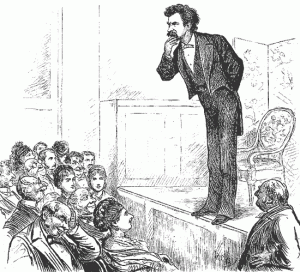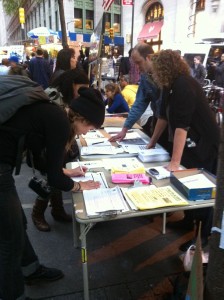 by Tim Foley
by Tim Foley
A critical part of the new health care law is being blocked by a handful of Republicans in the New York State Senate. New York must act before this July to secure tens of millions of federal dollars to set up a ‘health insurance exchange,’ and before the end of this year to remain in control of the process. Otherwise, New Yorkers will be lumped in with the default federal exchange along with the states that are openly defying healthcare reform in the courts, and New York’s historic, strong consumer protections could be undermined.
What exactly is an exchange? These transparent marketplaces for individuals without coverage and small businesses will work a lot like Expedia or Travelocity, but instead of shopping for the best airfares, New Yorkers will be able to compare health insurance plans and buy the one that’s the best fit. By pooling together, individuals and small businesses will have the same purchasing power available to large companies. Federal subsidies will be available to individuals and families to cap the premiums at a percentage of their income. And, to guarantee you’re getting high quality plans, members of Congress and their staffs will also be required to purchase their health insurance from the exchange.
More than 1 million New Yorkers will be receiving their insurance through the exchange by 2014.
Why is it important for New York State to move forward with its own health insurance exchange, rather than risk defaulting to the federal one? Here are the top seven reasons.
1) If New York State establishes its own exchange, we have every reason to believe it will establish a more progressive version of the exchange that could then be a model for other states. Historically, New York has been more progressive on health insurance issues than the federal norm, including already having a modified version of guaranteed issue and consumer rating (which the rest of the country gets through the Affordable Care Act), as well as prior approval for health insurance increases (which the rest of the country is still waiting on!) A more active, progressive, consumer-friendly and active purchaser, one that requires insurance companies be good actors rather than only providing plans that meet the definition of exchange-ready, will likely only come from New York building its own, because the state has always been on the cutting edge.
Keep in mind we don’t think a New York-designed exchange will be better because our legislature is so hot — clearly they’re having trouble passing a bill to establish the mechanism to build an exchange in the first place. But we tend to staff very competent, very progressive agencies, particularly when it comes to health. For all of its flaws, the Medicaid Redesign Team yielded much, much better results than any legislature that’s tackled the issue of reducing Medicaid costs.
That’s reason enough, and indeed the main reason — we think we can probably do it better and in a way that other smaller states will copy.
But here are a few others.
2) One of the functions of the exchange is to have “no wrong door” — if you’re trying to get insurance on the website or by calling and office and instead you qualify for the Children’s Health Plus or Medicaid or some other program like Families Health Plus, you’re automatically shuffled off to enroll in that program without having to go to another site or make another phone call. For that reason, it’s better for the consumer that everything be operated by New York State rather than some of it operated in state and some of it out of state.
3) You can potentially create a public option in a state if you’re also operating the exchange. Connecticut and Oregon are moving forward with their own versions of a public option, for example, and the long-term chances of opening up public options are state-by-state rather than federally (“Duh” says anyone who’s watched Congress for the past year and a half). I suppose you could find a way to create one even if you weren’t operating the exchange, but it becomes that much more difficult. Assemblyman Gottfried, among others, has been very keen on exploring some type of a New York public option.
4) #3 would also apply to if you want to take the steps to set up a statewide single-payer, like Vermont is doing.
5) There’s money for New York to set up its exchange now — and a lot of money. The feds will pay for all the start up costs if the state sets it up and hits the deadlines, including an important one this July. If we don’t hit the deadlines and default to the federal exchange, we may be able to set ours up in the future but we’ll entirely be paying for it yourself. And given #1, we’re going to want to do it sooner rather than later.
6) There’s some real concern that the feds may have real trouble getting the default exchange set up in time, given that there’s technically not enough money to do so based on HHS’s current budget. Unlike money for the state exchanges, money for the federal exchange is not automatic in the budget – HHS has to figure out how to make it work with its existing budget. Since so many states are refusing to set up their own exchanges, and the GOP is intent on blocking it in states that absolutely should be moving forward on their own (like New York and Minnesota), making the federal exchange that much harder to set up is another way that Republicans have been trying to sabotage implementation of health care reform so they can say, “Oh, see, it doesn’t work.” New York State alone has nearly 10% of the people who would get their insurance through the exchange and would, by far, be the biggest state other than Texas that the federal exchange would need to accommodate. That’s going to be a huge challenge.
Most of these are policy reasons or concerns related to the implementation of reform. But there’s one other reason that’s purely political because, well, the only reason New York hasn’t already passed this law is purely political.
7) It’s just stupid not to set up a state exchange. In June 2011, Governor Cuomo, the Democrats in the Assembly and the Republicans in the State Senate had agreed to a compromise to get the bill passed. But then Senator Greg Ball in a Republican conference meeting that summer said, “Wait, is this Obamacare?” Then they were against it. That’s it. That’s the whole reason.
(See the New York Times article, “G.O.P. Senators in Albany Block Federal Aid to Fulfill Part of Health Law”)
It’s worth repeating: the Republicans in the Senate were absolutely for an exchange until they realized it was Obamacare. Then they began throwing up nonsense objections because of the potential costs (the feds will PAY FOR THE START UP COSTS, people! You just have to pass the bill in time!) It’s obstruction pure and simple, and not even principled obstruction. It’s lame. And it shouldn’t be happening in what the Governor calls “the progressive capital of the nation.”
***
So what can you do? Call your State Senator today! We recommend calling State Senators Hannon (Garden City, Long Island): 516-739-1700 and Lanza (Staten Island): 718-984-4073, but you can also click here for others. Tell them New Yorkers can’t afford to wait, and that you expect them to put the exchange in the state budget. Let us know how it goes!
For more about this issue and a better script, click here.
 Talking about politics isn’t easy. How do you create a compelling message that will resonate with other volunteers – and influence the debate? And once you have a great message, how do you pitch the story to the press?
Talking about politics isn’t easy. How do you create a compelling message that will resonate with other volunteers – and influence the debate? And once you have a great message, how do you pitch the story to the press?

